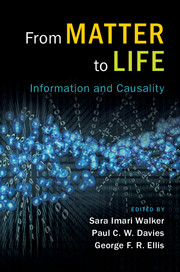Book contents
- Frontmatter
- Contents
- About the authors
- 1 Introduction
- Part I Physics and Life
- Part II Bio from Bit
- Part III Life's Hidden Information
- 8 Cryptographic Nature
- 9 Noise and Function
- 10 The Many Faces of State Space Compression
- 11 Causality, Information, and Biological Computation: An Algorithmic Software Approach to Life, Disease, and the Immune System
- Part IV Complexity and Causality
- Part V From Matter to Mind
- Index
10 - The Many Faces of State Space Compression
from Part III - Life's Hidden Information
Published online by Cambridge University Press: 02 March 2017
- Frontmatter
- Contents
- About the authors
- 1 Introduction
- Part I Physics and Life
- Part II Bio from Bit
- Part III Life's Hidden Information
- 8 Cryptographic Nature
- 9 Noise and Function
- 10 The Many Faces of State Space Compression
- 11 Causality, Information, and Biological Computation: An Algorithmic Software Approach to Life, Disease, and the Immune System
- Part IV Complexity and Causality
- Part V From Matter to Mind
- Index
Summary
Historically, scientists have defined the “macrostate” of a system, and the associated “level” or “scale,” in a purely informal manner, based on insight and intuition. For example, in evolutionary biology often the macrostate is an entire species, a quantification of a set of coevolving organisms that ignores within-species diversity, fundamental dependencies between organisms, and complicated subunits such as tissues and cells that can also reproduce. Similarly, in economics the macrostates of the world's socioeconomic system are often defined in terms of firms, industrial sectors, or even nation-states, neglecting the internal structure of these highly complex entities.
One might view the reliance of many sciences on such vague human “insight” into how to even describe a physical system – a reliance that has no formal justification – as troubling. How do we know that these choices for the macrostates are the best ones with which to analyze the system? How do we even quantify the quality of a choice of macrostate? Might there be alternatives that are superior to our choices? A superior choice might, for example, allow greater accuracy in our prediction of the evolution of the system and/or reduce the computational cost of making such predictions. Given the possibility that superior choices might exist, can we solve for the optimal macroscopic state space with which to investigate a system?
This question, of how best to compress amicrostate of a system into a macrostate, is the general problem of state space compression (SSC). To address this problem, we must first decide how to quantify the quality of a proposed map xt → yt that compresses a dynamically evolving “fine-grained” microstate xt into a dynamically evolving “coarse-grained” macrostate yt. Given a definition of the quality of any compression and a microstate dynamics xt, we can try to solve for the best map compressing xt into a higher-scale macrostate yt. The dynamics of such an optimally chosen compression of a system can be viewed as defining its emergent properties. Indeed, we may be able to iterate this process, producing a hierarchy of scales and associated emergent properties, by compressing the macrostate y to a yet higherscale macrostate y′.
- Type
- Chapter
- Information
- From Matter to LifeInformation and Causality, pp. 199 - 243Publisher: Cambridge University PressPrint publication year: 2017
- 6
- Cited by



